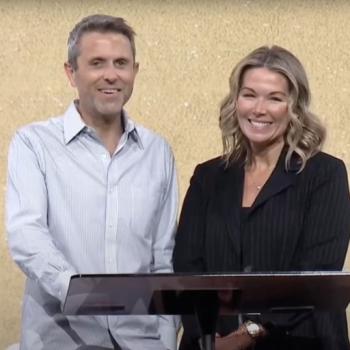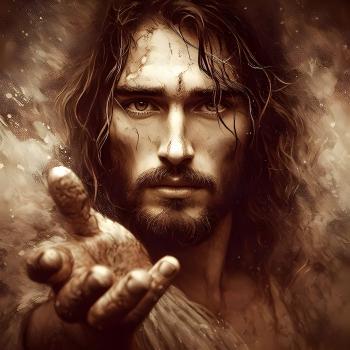We know little of Irenaeus' life. He was born in Asia Minor around 130 A.D. and later migrated to southern France to help with missionary work. A ferocious persecution broke out in Lyons, killing the bishop of the fledging church there. Undeterred, the infant community called Irenaeus to be its new leader. Persecution only made the church stronger. Like his Lord, Irenaeus viewed affliction as the path toward sure resurrection. He asked, "What, did the Lord wish that his apostles should undergo buffeting and that they should endure affliction? That's what the word says. Why? Because strength is made perfect in weakness, rendering one a better person who by means of infirmity becomes acquainted with the power of God. For how can a person learn that he is an infirm being, and mortal by nature, and that God is immortal and powerful, unless he learns it by experiencing it? There is nothing evil in learning one's weaknesses by suffering; rather, it has the beneficial effect of preventing a person from forming an undue opinion of his own nature."
Irenaeus' view on earthly faith was always with an eye toward heaven. It is from Scripture's promise of a certain future that faith finds its hope and strength to endure the present. The book of Revelation grants a glimpse of the celestial command center, the heavenly headquarters occupied by Almighty God. The blinding light of God's glory reflects off precious gemstones, as well as off the emerald rainbow that encircles the throne. Flashes of lightning and peals of thunder, reminiscent of Mt. Sinai, foreshadow ferocious wrath to be unleashed against evil. However the rainbow, reminiscent of God's promise to Noah, also foreshadows ferocious grace. God's justice is always tempered by mercy. Nevertheless, those enemies who in the end persist in scorning God's mercy will not be spared. The calm sea of glass, spread before the throne, testifies to evil's imminent demise. Throughout Scripture, a churning sea symbolizes the reservoir of satanic chaos. But in Revelation 4, the sea is calmed and evil defeated. Redeemed from its curses, creation is freed to fulfill its purpose.
What is its purpose? John paints a picture of worship. Four living creatures representing all animate life on earth surround God's throne and sing, Holy, Holy, Holy. With their wings they evoke the seraphim of Isaiah who sang the same song. Their coverings of eyes shows that God forever watches over them. Rightly joining in their chorus are twenty-four elders who embody the redeemed people of God. Their robes and crowns are their rewards for persevering faithfulness, the thrones are their own seats saved in heaven. However these elders readily bow and relinquish their crowns "whenever the creatures give glory, honor and thanks to the one who sits on the throne and who lives forever and ever." Casting down their crowns they acknowledge the worthiness of God. Why? Because, "You created all things, and by your will they were created and have their being."
It is interesting that in a book focused on the final outcomes of God's redeeming work in Christ, God's creatures give praise not for their salvation, but for their creation. This is interesting because we tend to think of creation as prior to redemption, subject to the fall—marred and messed up by people. Redemption is God's response to human sin. Yet that chronology begs the question as to how God's creation, made as good, could ever go so bad. It's as if God's work was not quite up to snuff. How did a couple crafted in God's image at creation get tempted so easily? It's the same question we can ask of those whom by faith are "new creations" in Christ. How is it that we who possess the very Spirit of God nevertheless choose to behave in ways so contrary to that Spirit? We answer that God is not done with us yet. That we've yet to become who we will be in Christ.
Irenaeus asked, "Could God not have made humanity perfect from the beginning? One must know that all things are possible for God, who is always the same and uncreated. But created beings, who have their beginning of being in the course of time, are necessarily inferior to the one who created them. Things which have recently come into being cannot be eternal; and not being eternal, they fall short of perfection for that very reason. And being newly created they are therefore childish and immature, and not yet fully prepared for an adult way of life. And so, just as the mother is able to offer food to an infant, but the infant is not yet able to receive food unsuited to its age, in the same way God, for his part, could have offered perfection to humanity at the beginning, but humanity, being created, was not capable of receiving it."
Because human beings exist as creatures created, we exist as children, Irenaeus argued, which explains why the first humans were so easily deceived. The image of God was their destiny more than their starting point. Irenaeus taught that God provided his word and spirit as tutors toward this destiny, along with angels too. But if you're depending on angels to teach you well, what happens when one of your teachers envies the lofty heights for which you're destined and decides to sabotage the lesson? Irenaeus said you get a snake in the garden—an angel gone bad who deceived Adam and Eve and sidetracked their development.





